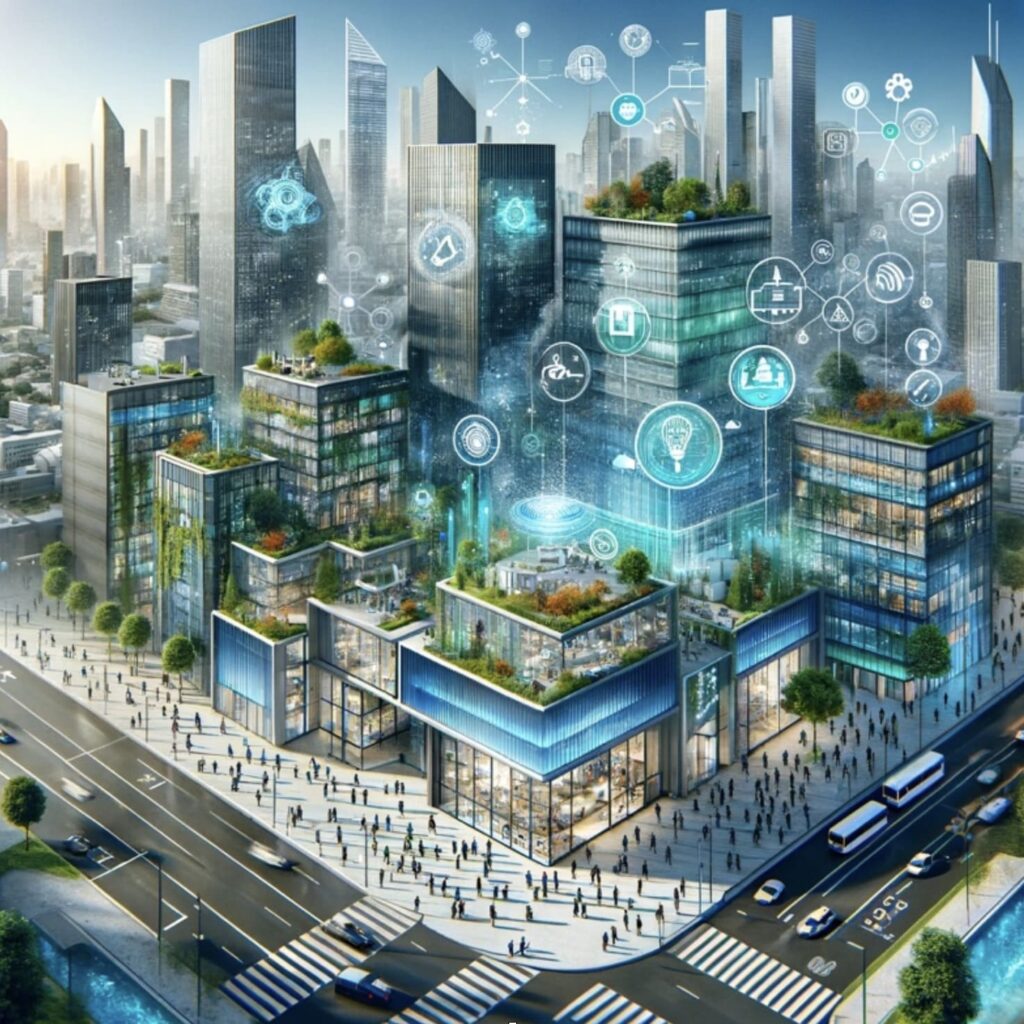What is a Smart Building?
A smart building utilizes advanced technology and interconnected systems to collect data and automate processes, aiming for improvements in efficiency, occupant comfort, and energy usage. These buildings are equipped with sensors, actuators, and microchips that allow for the management of internal and external conditions, actively ensuring optimal operation at all times.
Navigating the Buzzwords: Digital vs. Smart vs. Intelligent
The journey from digital to smart, and then to intelligent buildings, is one of evolution and sophistication. Most modern buildings can be considered digital thanks to their use of technology for basic operations. However, smart and intelligent buildings take it a step further by not just using technology but by leveraging it to learn from and adapt to the needs of their occupants and the environment:
- Digital Buildings: Equipped with technology for basic functions and operations.
- Smart Buildings: Utilize more advanced, interconnected technologies to optimize efficiency and user comfort.
- Intelligent Buildings: Incorporate AI and machine learning to anticipate needs, improve operational efficiency, and enhance occupant experiences proactively.
Use Cases – What Are They?
Use Cases are Automation and Intelligence Defined by Outcomes
Smart buildings leverage automation and intelligence to redefine the relationship between a building and its occupants, its environment, and its managers. These aren’t just buildings with automated systems; they are ecosystems that use data and connectivity to create outcomes that were previously unimaginable. Here are a few use cases that illustrate the potential:
Energy Management and Optimization: By analyzing data from sensors and usage patterns, smart buildings can significantly reduce energy consumption. For instance, lighting and HVAC systems can automatically adjust based on occupancy or time of day, leading to substantial energy savings.
Predictive Maintenance: Instead of relying on scheduled maintenance, smart buildings predict when systems need servicing. By monitoring the condition of equipment in real time, they can alert managers to potential issues before they escalate, preventing downtime and saving costs.
Space Utilization and Management: Through the use of occupancy sensors and analytics, smart buildings provide insights into how spaces are used, enabling optimization of the layout and facilities to better serve the needs of occupants and reduce wasted space.
Enhanced Security and Safety: Intelligent security systems can go beyond surveillance to analyze patterns and predict security breaches. Additionally, smart buildings can integrate fire detection and suppression systems that not only alert occupants but also guide them to safety more efficiently.
The Benefits of Smart Buildings: A closer look
The transition to smart buildings brings with it a host of benefits that touch on every aspect of property ownership and management:
Cost Savings and Economic Efficiency: One of the most immediate benefits of smart buildings is the reduction in operational costs. By optimizing energy use and streamlining maintenance operations, buildings can achieve significant cost savings over time.
Sustainability: Smart buildings play a crucial role in environmental stewardship. Through efficient energy use and reduced greenhouse gas emissions, they contribute to a more sustainable future, aligning with global efforts to combat climate change.
Occupant Comfort and Productivity: By maintaining optimal indoor conditions and allowing for personalization of spaces, smart buildings enhance occupant comfort, which can lead to increased productivity in workspaces.
Operational Resilience: The predictive analytics capabilities of smart buildings ensure that they are more resilient to operational challenges. By anticipating and mitigating issues before they arise, these buildings can maintain operations without significant interruptions.
Asset Value Enhancement: Beyond operational benefits, smart buildings are attractive to tenants and investors alike, often commanding higher rents and valuations due to their advanced features and efficiency.
These benefits are just the tip of the iceberg. As technology evolves, so too will the capabilities and advantages of smart buildings, making them an indispensable part of our urban landscape.
Getting Started: The First Steps
Embarking on the journey to smart building integration involves a strategic approach:
Understand Your Organization’s Goals and Challenges: Identify what you aim to achieve with smart technology—whether it’s cost reduction, energy efficiency, enhanced security, or improved occupant satisfaction.
Start with a Strategy: Develop a comprehensive plan that aligns with your goals, budget, and timeline. This includes auditing current systems, identifying areas for improvement, and prioritizing projects based on impact and feasibility.
How Evolv Engineering Can Guide Your Smart Building Journey
At Evolv Engineering, we specialize in the art of the possible. With our deep understanding of smart technology and its application in the real estate sector, we’re here to demystify the process and guide you through every step of your smart building journey. From initial assessments and strategy development to implementation and beyond, our team is equipped to transform your properties into the smart buildings of the future.
In conclusion, the evolution from digital to smart buildings represents a significant leap forward in how we think about and interact with our built environment. As we continue to explore the endless possibilities of these technologies, the role of expert consultants like Evolv Engineering becomes ever more critical. Stay tuned for our next article, where we’ll delve deeper into the steps for getting started on your smart building journey, ensuring that your move towards a more intelligent, sustainable future is both successful and seamless.




